author: Gregory Bobrek
Tyranny Review – an RPG full of contrasts
As we wait for the sequel to Pillars of Eternity, Obsidian Entertainment gives us Tyranny – a game where we play as the Big Bad’s loyal agent. This short-term project features numerous ideas and mechanics, but only some of them pay off.
The review is based on the PC version.
- Classical solutions aimed to please fans of the genre;
- Many ways to play an evil character;
- Intriguing setting, companions and opponents.
- Too many fights with identical groups of enemies;
- Inconsequence and dead ends in some of the choices;
- Many systems are implemented half-heartedly.
Tyranny is a project from Obsidian Entertainment that appeared almost out of nowhere. After the success of Pillars of Eternity we expected the devs to be hard at work on a continuation. The veterans of RPG development, however, have picked up a side job – they've returned to an old project, buried deep in their archives for years after it almost sank the company in 2012. For Feargus Urquhart's team it was all about sentiment – settling some scores with the past by digging up the world and the story of a game that could've been an Xbox One launch title but ultimately led only to mass lay-offs and financial instability of the company.
It seems that by releasing Tyranny so suddenly, Obsidian itself has submitted to the tyranny of the new era, with its growing popularity of classic role-playing games and the market which abhors vacuum and demands regularity. It’s clear that the product, which was conceived as an escape from larger, epic RPGs, is a game whose premise was formulated centuries ago and was finished quickly in-between other big titles. Tyranny is a patchwork of all kinds of mechanics and ideas – while some of them may spark some enthusiasm, others will raise nothing but doubt.
Obsidian's new fantasy world is certainly impressive, being an intriguing mix (at least to me) of antiquity and Robert E. Howard's world of Hyborian Age. It has both the atmosphere of brutal conquest, as delivered by the ancient Romans, with some twisted form of the pax romana to boot, but also magic that permeates the entire universe, ancient artifacts and architecture of mysterious origins. And although ancient relics play a key role in the story and numerous magic skill effects flow like a stream through every minute we spend in combat, the new RPG from Obsidian is surprisingly down-to-earth. There are no fantastical beasts or races here. In Tyranny, powerful spells and artifacts are only tools to conduct politics, and intrigue and struggle for power have priority over anything else.
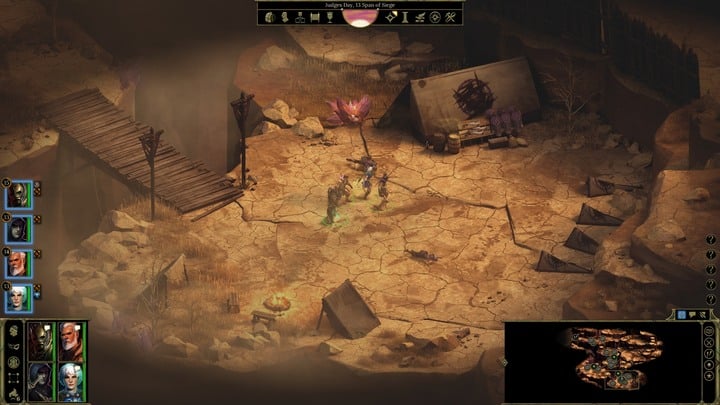
In this respect Tyranny resembles Age of Decadence, which also took some inspiration from Ancient Rome, because greater importance is attached to conversation and decisions than to exploration and discovering new kinds of monsters and treasures. Even the story outline is unique. In the newly-conquered province of a powerful empire things are on the boil again, and the forces amassed to pacify the uprising lose more time on vicious infighting than on achieving their goal. The main character, an elite agent of the dark lord, is sent to the front lines to motivate commanders to put more effort into important matters. As a result of some unexpected developments, however, the player will be forced to stir up the hornet's nest of the southern provinces even further, and instead of enforcing peace, he sets in motion a course of events that will have enormous significance for the future of the whole world.
Tyranny sets the bar rather high – as soon as in the prologue, we face difficult decisions when choosing potential allies (and enemies), and in the first act we have a time limit hanging over our head, within which we have to complete our main quest for that chapter. It's been a long time since I've felt such pressure in a classic RPG – the writers were able to brilliantly depict the position of a diplomatic envoy who needs to carefully weigh each and every word that leaves his mouth. Everything we say is judged by someone, somewhere – be it members of our party, representatives of the two major factions, or the inhabitants of the conquered territories.
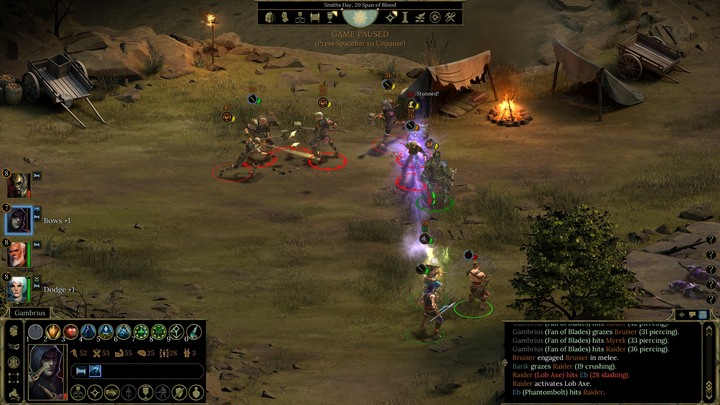
First thing we have to come to terms with, and quickly, is the fact that there's no way for everyone to like us; for some loyalty is built on respect, for others fear is motivation enough to be loyal. Tyranny takes on the interesting idea of toying with RPG conventions – the game can punish us for checking out all available dialogue options. By asking a stupid question we can offend a character we wanted to befriend; sometimes simply walking away is a better option than trying to manipulate our increasingly irritated interlocutor.
This does not mean, however, that the number of variables in this plot equation is infinite. During the game, especially in the beginning, the player can be under a strong impression that everything in this virtual world changes depending on their actions. Ultimately, however, the story is heading towards one of the four main endings, which are supplemented by the consequences of the decisions we made during side quests. The course of certain plot lines is – unfortunately – simply disappointing. Pretty soon, the game forces us to choose a clear path from which there is no turning back, and from there everything proceeds at breakneck speed to a hurried finale. In all cases our path becomes more and more riddled with combat instead of intrigue, and what is worse, the closer to the climax, the more visible are the defects in the logic of Tyranny and the insignificance of certain decisions.
As an example, I'll share with you the story of one of my companions, who didn't agree with the majority of my decisions from the very beginning. During the dozen+ hours of fun I was unable to earn even the most elementary loyalty from his person – he was afraid of me, though. It would seem that at some stage of the game I'd have to reap the fruits of this ambivalent relationship. The man, however, stayed with me to the very end, even when it came to beating up his ex-buddies from the army. It turns out that regardless of the ups and down on the graphs of loyalty and fear, our companions will remain in the team either way. They will simply find some other motivation to do so. What's more, in the current version we can find certain inconsistencies, although this is quite understandable given the number of potential variables. The same companion at some stage of the game literally lost his voice (and mind to boot), but it did not prevent him from speaking in scripted dialogue scenes, as if nothing had happened. I am picking on these minor shortcoming, because Tyranny's most crucial aspect is clearly the plot. If it weren’t for the plot, we would be dealing with a production just slightly above average, at best. Why is that?
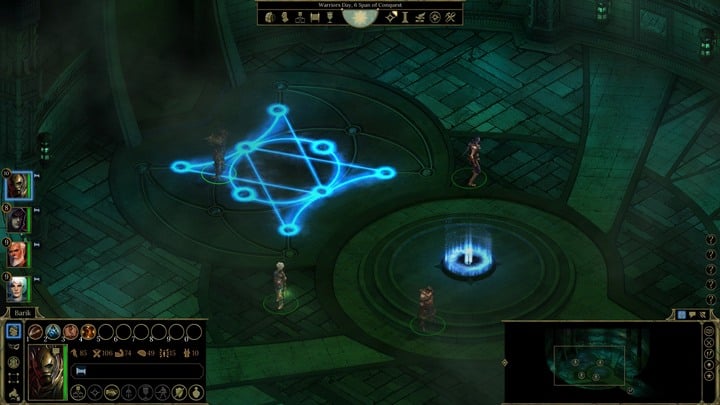
When playing Tyranny one can't shake the feeling that the game was cut to a size that would be easy to digest for the publisher. Something that at the outset was probably a game intended for dozens of hours, ended up as a modest title with mechanics pulled from a completely different story; and some of those mechanics not only have little to offer but, what’s worse, also get in the way of enjoying the overall intriguing events of the main story. We have base expansion and complicated crafting systems. Managing our HQ (in the form of towers) initially surprises with the number of available options – we can hire i.e. craftsmen, teachers, or scholars. We outsource weapon smithing and shipments, conduct research projects on ancient scrolls, collect raw materials for the production of potions. However, before the system gets the chance to show its greatest advantages, the story is almost finished. The unexpected ending cuts short many plot threads, but also makes us doubt the sense of the whole estate managing activity – suffice it to say that my team of scientists had the time to develop only two artifacts, which in the end didn't play any significant role in dealing with the obstacles standing in my way.
Same goes for the spellcrafting system – by combining the available runes we can get powerful and sometimes unusual versions of some spells. The game, however, does not encourage too much research and experimentation with magic, because from the first hour or so our characters are almost drowning in a sea of ??available active skills. As usual, their arsenal expands with gaining new experience levels, but in Tyranny new skills are gained also by achieving certain levels of reputation with factions and party members, as well as for using certain relics. Our action bar fills up with new options at an alarming rate, leading to ruthless selection, and the last thing we need is yet another spell.
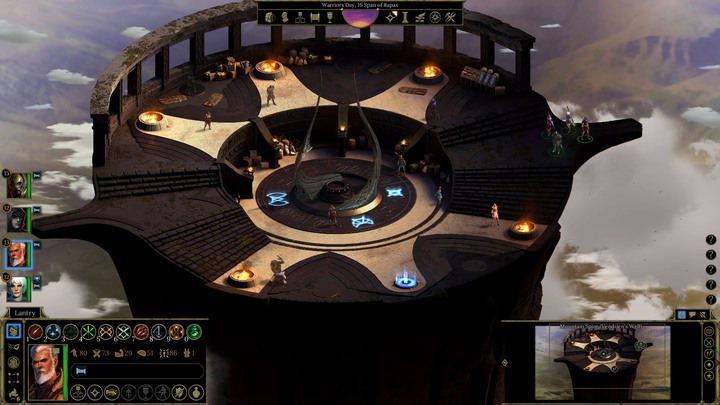
The problem is that Tyranny couldn't make up its mind and take a clear-cut path that would show only its advantages – the designers felt obliged to add content that feels like taken from a completely different story. For a game focusing on diplomacy and intrigue, we have far too much fighting with the copy-paste groups of opponents. Extracting magic from a fantasy world has its consequences: the reduced bestiary means that there are only three types of opponents – humans, ghosts or beastmen. Given that in the second half of the game combat becomes the main focus, we face a series of almost identical combat encounters, making it very easy for the whole thing to get old really fast.
The game has no surprises, no moments of discovery when we find an overgrown dung beetle in some corner of the map, or the excitement stemming from underground exploration; such things are possible only when we don't know what is waiting for us in the next location. After the first few hours Tyranny runs out of all surprises it may have had prepared for the player in combat. There are some, however, waiting for us in the location design, which, on more than one occasion, brings to mind post-apocalyptic fantasy. The realms we visit have felt the burden of war in many ways, and disasters caused by magic have changed the face of a once-fertile land. Certainly, in this respect, we are definitely not dealing with recycled ideas from Obsidian's previous game.
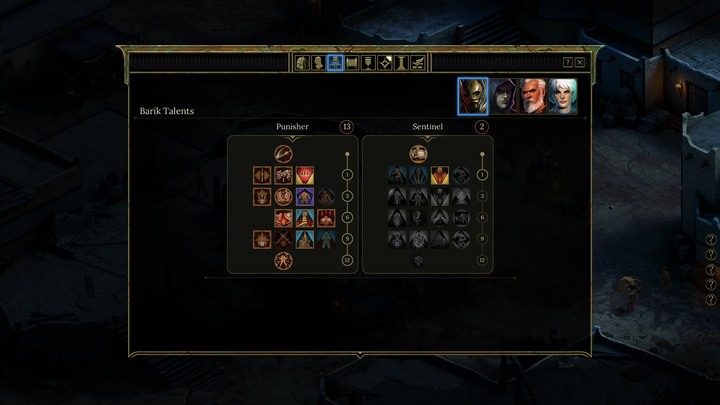
The strenuous efforts to prove that Tyranny is not just a modification of Pillars of Eternity have also affected the character progression system. Goodbye, good old Dungeons and Dragons formula – this time new levels are gained by using and improving active skills, which is not unlike the idea adopted by the The Elder Scrolls series. Each level-up provides one point to be distributed between the main attributes and one new skill from the class tree. This colossal departure from the classic approach is not without consequences, sometimes quite unexpected – first of all there is a rift between characters that are developing many skills at once, and those that are highly specialized. My archer avoided the front lines, and so he improved only in the use of ranged weapons. At the same time, an armored warrior would improve his melee, block and dodging skills, overall developing much faster as a character. At the end of the game the discrepancy in total experience points was considerable – equal to almost 3 levels! One more thing that worked against my archer was the combat tactics. Combined actions, requiring two characters to execute them simultaneously, also tend to reward close contact with the enemy, so my character, against anyone's better judgment, had to shorten the distance way more often than he'd like to.
This paradox clearly reflects my impressions – Tyranny is a game of many dramatic contrasts. On the one hand, the game pretends that each dialogue is important and the players, no matter what they do, are always involved, in one way or another, in the main story. At the same time, however, the designers have added a few mechanics ripped from a much larger, vastly more expansive production, only to squeeze them into a narrow framework that prevents those ideas from spreading their wings. And although Tyranny in itself is not very long for an RPG (completing it will take about 20 hours), I am pretty sure that squeezing it even more and allowing it to focus would yield better results.
Despite of its drawbacks, Tyranny remains a solid game with an intriguing world, interesting companions and engaging enough for me to want to see it through to the end and get to know the results of all the decisions I made. It is impossible to deny Obsidian their inventiveness, playing with old tropes in the dialogues and juggling the different visions of Evil in fantasy. Once the end credits roll, we’re tempted to start a new playthrough and test how differently the whole story could have turned out. We’re tempted until we remember the mechanics and copy-paste segments common to each of the available paths. During my second Tyranny playthrough, while I was curious of the consequences of other decisions, it was difficult for me to sit through the fights, which were quickly becoming indistinguishable from one another. Cleaning up locations of enemies is just too repetitive to be the mainstay of a product that has its greatest asset in the exploration of alternative story lines.
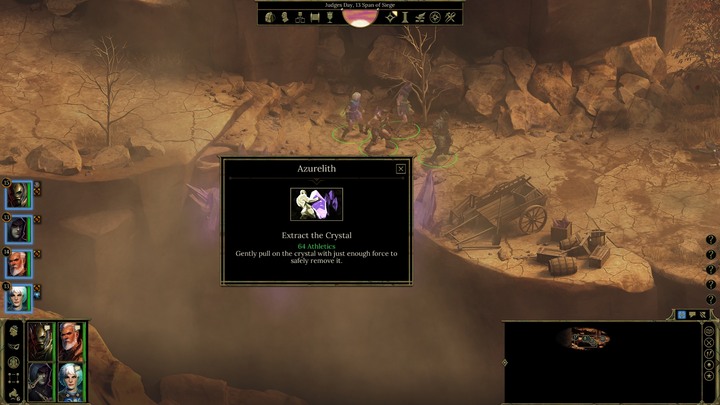
After all is said and done Tyranny remains a proposal that will be controversial among fans of the genre. An ambitious, unique plot is being sold in a package with a lot of mediocre ideas. Delight born in the first hour is killed in the following acts, when the game begins to put too much emphasis on combat, which seems to be only a cheap filler in place of some truly interesting content. This lack of consistency is visible on many levels, which may worry when we are talking about a game coming from the veterans of the genre. Now the question remains, what lessons will Obsidian learn from this – we shall see after the release of Pillars of Eternity 2.
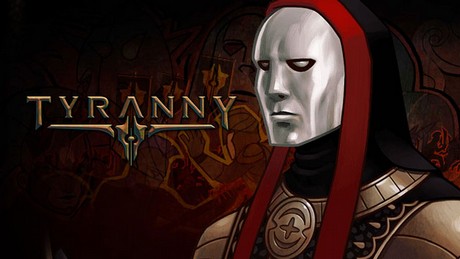
Tyranny Review – an RPG full of contrasts
game review
As we wait for the sequel to Pillars of Eternity, Obsidian Entertainment gives us Tyranny – a game where we play as the Big Bad’s loyal agent. This short-term project features numerous ideas and mechanics, but only some of them pay off.
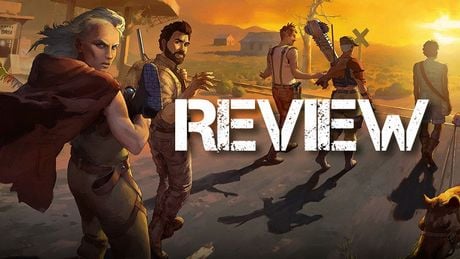
Broken Roads - Trite Post-apocalypse for the Very Patient and Understanding
game review
Broken Roads is an unfinished game that can be downright exhausting, entangling us in a plot without a reasonable cause-and-effect sequence and forcing us to play an errand boy. Only the most patient players can find their way in this post-apo.
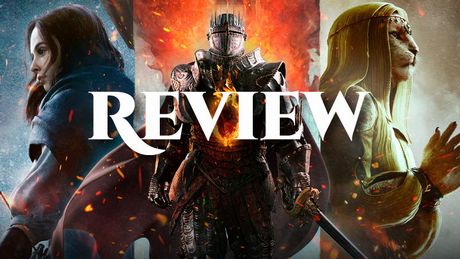
Dragon's Dogma II - Epic Game that Won't Engage Everyone
game review
Dragon's Dogma II is a gripping RPG that gets more addictive the longer you play. At the same time, the production faces technical issues, and the experience as a whole seems more niche-oriented at times.
